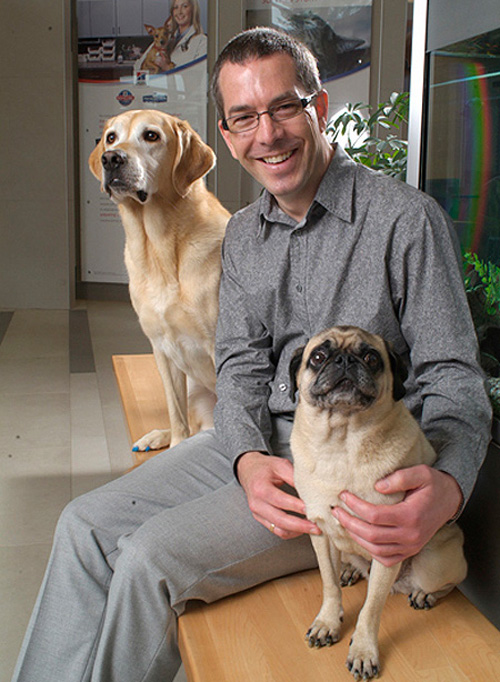
If you were to die tomorrow, what would happen to your pet? A pioneering endowment program planned at the Hill’s Pet Nutrition Primary Healthcare Centre (PHC) at U of G will help look after pets even after their owners are no longer around.
That program is among new services and facilities ─ including a proposed doggie daycare ─ to be offered by the healthcare centre, which opened this past summer at the Ontario Veterinary College (OVC). As part of the OVC Health Sciences Centre, the facility is a full-service veterinary hospital that integrates preventive and general medicine with nutrition, behaviour, public health, animal welfare and other programs.
The centre’s planned endowment program is believed to be the first of its kind in Canada, says PHC director Shane Bateman. Similar programs at veterinary schools in Texas and Kansas allow clients to set up an endowment fund ─ $10,000 or more ─ that pays for pet care following the client’s death.
“The client would leave us an endowment to provide medical care and upkeep of the animal for the rest of its life,” he says. Clients would spell out plans for their pets, including endowment details, in their legal will.
OVC is still working out details of the program, which is likely to begin in 2011. The college will work with lawyers and financial and estate planners to promote and administer the program, but Bateman says PHC will begin a local registry of prospective foster families to take pets under the program. Animals would arrive at U of G for an initial checkup and then be sent to their new homes; OVC would retain ownership of the pets.
“Pets are now a much different and bigger part of our families,” says Bateman, who has two dogs and a cat at home. “If people have no family or friend or someone to take on care of their family member (pet), then they’re looking for other places for that to happen.”
Similar sentiments underlie the centre’s dog daycare program, set to begin in early December. About 10 to 15 dogs will be included initially, probably selected from among existing OVC clients.
Other canine daycare programs exist elsewhere. At U of G, dogs will be housed in kennels that ring a play area ─ complete with a flushable Astroturf patch beneath a skylight ─ within the 18,000-square-foot building at the west end of the OVC complex.
“Our goal is to be a high-quality situation where we’re not just taking all comers but screening dogs to ensure that they’re going to be well taken care of, that they’re having healthy social interactions and are challenged in positive ways to be better dogs.”
Other facilities in the new centre include a rehabilitation room with an underwater treadmill and a resistance pool for animals recovering from injury or surgery or being treated for obesity or arthritis.
The centre has two surgical suites, ultrasound and radiology rooms, a dental suite, a pharmacy, examination rooms, a nutrition centre and a community-learning centre; the latter is for clients, not pets. PHC employs three veterinarians, three veterinary technicians, three customer service representatives and an animal care attendant.
Veterinary students undertake primary health care rotations to learn about day-to-day aspects of running a practice, from treating routine cases to improving communication skills. “About three-quarters of graduating veterinarians will do small-animal medicine exclusively or as a major component of their practice,” says Bateman.
He hopes to attract up to 3,000 clients to PCH. As with any other primary veterinary practice, Bateman says clients need not be referred to the new campus facility.
Initially trained as a veterinarian in Saskatchewan, Bateman studied small-animal medicine at U of G. After a residency in emergency and critical-care medicine, he joined Ohio State University as a clinical professor. In early 2009, he returned to Guelph as a PhD student with Prof. Jason Coe, Population Medicine. Appointed to PHC last fall, Bateman is taking a break from his studies of veterinary communication.